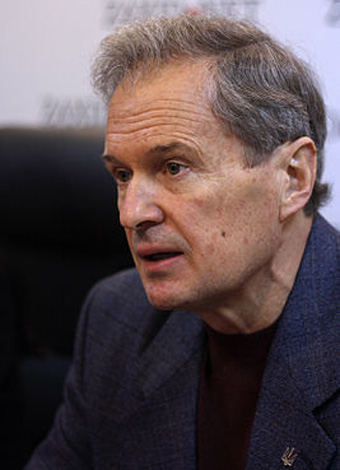Kostenko, Yurii
Kostenko, Yurii [Костенко, Юрій], b 12 June 1951 in Nova Obodivka, Obodiv raion, Vinnytsia oblast. Politician and parliamentarian; leader of the Ukrainian Popular Movement wing of the Popular Movement of Ukraine (Rukh). Graduating in engineering from the Zaporizhia Machine-Building Institute in 1973, he also completed (1983) the candidate’s degree with a dissertation on the plasmic working-up of metals. During the 1970s and 1980s, he was an engineer and scientist at the Institute of Electric Welding of the Academy of Sciences of the Ukrainian SSR. A member of Rukh since 1989, and its deputy leader from May 1998 to February 1999, he was first elected to the Supreme Soviet of the Ukrainian SSR in 1990, and served on the ecology commission. From October 1992 to May 1998, he was minister of the environment. He strongly articulated Ukraine’s position on nuclear weapons and the Chornobyl nuclear disaster consequences, including in the pages of Foreign Affairs and The Economist. Re-elected to the Supreme Council of Ukraine in 1994 and again in 1998, he served on the parliamentary nuclear policy committee and was in the Rukh caucus. Following the ouster of Viacheslav Chornovil as Rukh leader in February 1999, a caucus split ensued with Kostenko becoming leader of its dissident wing, calling itself Ukrainian Popular Movement (UNR).
In 1999, he was a candidate for president, obtaining 2.2 percent of the vote, sixth out of 13 contenders. A strong opponent of Leonid Kuchma and equally strong backer of Viktor Yushchenko, Kostenko’s fraction formed part of the Our Ukraine electoral alliance in 2002, with Kostenko himself as deputy leader of the bloc. At its congress in January 2003, Kostenko’s UNR changed its name to Ukrainian People’s party (UNP), and Kostenko was elected its leader. Kostenko was especially vociferous in his criticism of Kuchma, demanding his impeachment, over the creation of a common economic zone with the Russian Federation, Belarus, and Kazakhstan in September 2003.
During the Orange Revolution, Kostenko was a member of the National Salvation Committee from November 2004 to January 2005. In the Supreme Council of Ukraine during that convocation (from 2002), he was a member of the committee on the fuel and energy complex and nuclear policy and safety. He was also a member of the Supreme Council’s permanent delegation to the Parliamentary Assembly of the Council of Europe (PACE).
At the end of 2005, Kostenko and Ivan Pliushch formed the eponymous electoral bloc, the Ukrainian Popular Bloc of Kostenko and Pliushch, which consisted of the Party of Free Peasants and Entrepreneurs together with Ukraina Soborna in addition to Kostenko’s own UNP. The bloc entered the 2006 elections to the Supreme Council of Ukraine with Kostenko as number one on the list, but obtained 1.9 per cent of the vote, insufficient for representation. The following year, 2007, he and Pliushch joined Viktor Yushchenko’s Popular Self-Defense (NUNS) bloc and were elected as part of the latter’s 72 parliamentarians. For his loyalty, Kostenko was appointed ambassador to China by President Yushchenko on 3 June 2009. Kostenko was nominated by the UNP as its candidate in the presidential elections in October 2009, and subsequently received 0.2 percent of the vote—12th out of 18 contenders. He was dismissed as ambassador to China (and Mongolia) by President Viktor Yanukovych in September 2010, and in 2013, was recognized by the Institute of World Policy as one of the top ten ambassadors of Ukraine abroad. In the 2012 elections to the Supreme Council of Ukraine, the UNP ran under the Our Ukraine umbrella with Kostenko as number two on the list. With 1.1 per cent of the vote, the bloc obtained no representation in the Supreme Council. Kostenko did not participate in the 2014 elections to the Supreme Council following the Euromaidan Revolution.
Over the course of his political career, Kostenko has also served on a great many national and presidential boards and commissions, including the Security Service of Ukraine council, the Council of National Security and Defense (RNBOU, 1996–8), the commission on matters of nuclear policy and ecological security (1997–2001), as well as the state commission on administrative reform (1997–2001).
Bohdan Harasymiw
[This article was written in 2020.]
